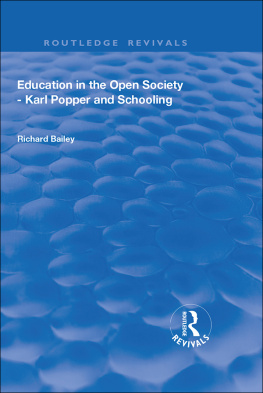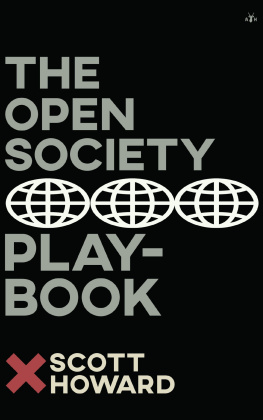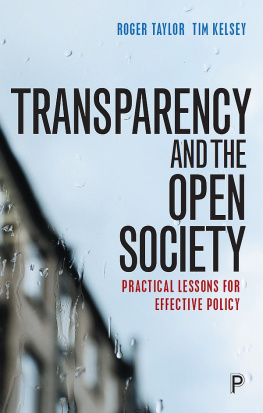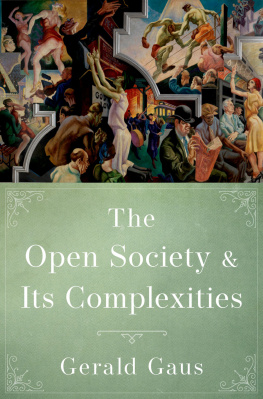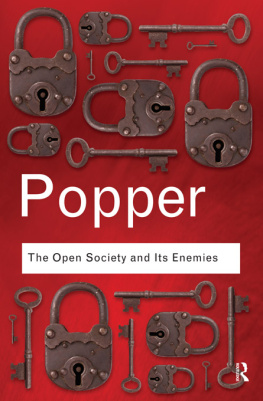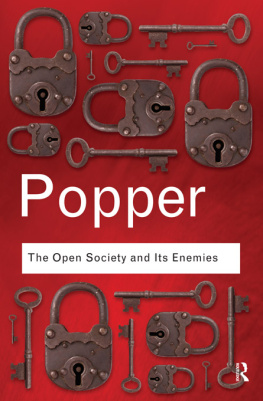ROUTLEDGE LIBRARY EDITIONS: HISTORIOGRAPHY
Volume 7
HISTORIANS AND THE OPEN SOCIETY
Historians and the Open Society
A R Bridbury
First published in 1972 by Routledge & Kegan Paul Ltd
This edition first published in 2016
by Routledge
2 Park Square, Milton Park, Abingdon, Oxon OX14 4RN
and by Routledge
711 Third Avenue, New York, NY 10017
Routledge is an imprint of the Taylor & Francis Group, an informa business
1972 A. R. Bridbury
All rights reserved. No part of this book may be reprinted or reproduced or utilised in any form or by any electronic, mechanical, or other means, now known or hereafter invented, including photocopying and recording, or in any information storage or retrieval system, without permission in writing from the publishers.
Trademark notice : Product or corporate names may be trademarks or registered trademarks, and are used only for identification and explanation without intent to infringe.
British Library Cataloguing in Publication Data
A catalogue record for this book is available from the British Library
ISBN: 978-1-138-99958-9 (Set)
ISBN: 978-1-315-63745-7 (Set) (ebk)
ISBN: 978-1-138-18777-1 (Volume 7) (hbk)
ISBN: 978-1-315-64292-5 (Volume 7) (ebk)
Publishers Note
The publisher has gone to great lengths to ensure the quality of this reprint but points out that some imperfections in the original copies may be apparent.
Disclaimer
The publisher has made every effort to trace copyright holders and would welcome correspondence from those they have been unable to trace.
Historians and the open society
A R Bridbury
First published 1972
by Routledge & Kegan Paul Ltd
Broadway House, 68-74 Carter Lane,
London EC4V 5EL and
9 Park Street,
Boston, Mass, 02108, U.S.A.
Printed in Great Britain by
Clarke, Doble & Brendon Ltd
Plymouth
A. R. Bridbury 1972
No part of this book may be reproduced in
any form without permission from the
publisher, except for the quotation of brief
passages in criticism
ISBN 0 7100 7337 2
Contents
War, bureaucracy, and constitutional development :
some neglected costs |
The author of Ecce Homo was driven by the reaction of some of his critics to the tone of confident dogmatism that they professed to find in his writing to submit a modest disclaimer in the fifth edition which so exactly expresses my own feelings that I am constrained to quote it here.
Dogmatism is no doubt used by superiors to inferiors, but it is also used in conversation between people who feel themselves perfectly equal. Expressions of modest deference, confessions of fallibility and imperfect knowledge are wearisome between equals. The writer addresses throughout free inquirers like himself, and uses the tone which he would like others to adopt towards him. His book is not a book of authority, but of inquiry and suggestion; it is intended not to close discussion, but to open it.
Throughout the following pages the phrase 'the historian' is used as a concession to brevity, and not by any means as a comprehensive indictment of everyone who writes history. And the book itself is addressed to those reasonable men and women with a taste for history who, in politics, are weary of the mendacious claims of the protagonists of left and right, who value the libertarian ideals that both sides claim exclusively for themselves, and who are fearful for the future of liberty.
Historians who live in the world's liberal democracies have every inducement to lead double lives. Victorian pillars of society proclaimed the sanctity of hearth and home, idealized the purity of their wives and daughters, and slept with pretty housemaids on the sly. Sexual morals, for all their tumultuous complexity, have now lost that particular kind of tortuosity. Historians are tempted professionally. They proclaim the sanctity of the democratic process, idealize liberty, and yet, when they turn to their professional work, promptly disown their political beliefs and forswear the values upon which these beliefs depend.
They subscribe wholeheartedly to the belief that the political system is, or should be, a free partnership of men and women who nevertheless differ from one another in every conceivable way, and to the belief that such differences should on no account be allowed to compromise the equal status of all members of the partnership before the law, their equal rights in politics, and their equal access to opportunities for advancement in public life, business, and the professions. To crown all, they subscribe to the further belief that nothing but the constraints imposed by neighbourliness and the calls of social obligation should prevent anyone from living life as he wishes to do and making whatever he pleases of it.
Surely no compound of liberalism and egalitarianism could be conceived of which was more unstable or potentially more explosive than this one. It calls for the harnessing of the fraternal and conciliatory impulses and the liberation of the individualistic and idiosyncratic ones. It requires self-discipline and social discipline, and yet it cannot dispense with competition without sacrificing a vital medium of self-expression and one of the chief safeguards of the liberty of the subject. Willing the end, liberal democrats are presumably content to will the means. And historians who subscribe to the theory of liberal democracy are consequently committed to a profound faith in a variety of humane and egalitarian values and to the profound conviction that what a man does or says or thinks or feels is, at bottom, very much his own business and no-one else's.
When they turn to the past, however, historians are irresistibly tempted to betray their complex and somewhat whimsical political and social beliefs. When they turn to the past, it is not with the austerely dispassionate eye that sees but does not judge; nor is it with the compassionate heart that judges by the standards of the time and the temptations of the moment: all too frequently it is with the mawkish rapture of the sycophant for whom scarcely anything is so bad that success cannot redeem it.
It is not difficult to understand why they are so irresistibly tempted. The past leaves few traces. Thoughts, feelings, and actions, are fugitive things that rarely make a mark indelible enough to be transmitted to posterity. And when they do, how badly they travel! The historian is heir to no rich heritage. He is a beachcomber, more than content when he is fortunate enough to be a 'snapper-up of unconsidered trifles'. In the welter of mischances, utterly random contingencies, and rare strokes of good fortune, which determine the provisioning of his stock of materials, certain events, and certain personages, stand out. The historian clings gratefully to these and makes them central to his theme. On the whole the people with whom he deals have done well for themselves. They belong to the dominant classes and control the dominant institutions. The historian steeps himself in their affairs; relishes their triumphs; extenuates their mistakes; deplores their misfortunes; and presently finds himself taking them at their own valuation. In this way the concept of success insinuates itself into the historian's mind, where it thrives to such effect that eventually success becomes the touchstone of his scale of values. From the point where the historian recognizes greatness and rejoices to see it succeed, the descent is steep and rapid to the point where he sees success and calls it greatness, and to the further point where he discovers that overwhelming power is its own justification, whether in men or in institutions, whether in nations or in businesses.






